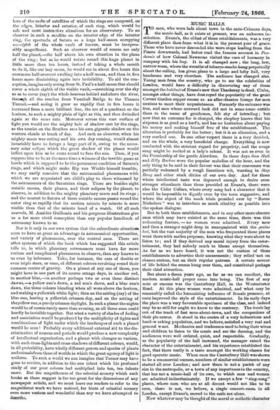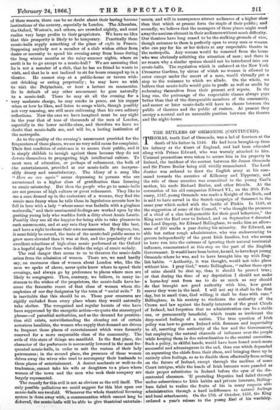MUSIC' ITAT.T.S.
TO men, who were lads about town in the ante-Crimean days, the music-hall, as it exists at present, was an unknown in- stitution. Evans's, the oldest of these establishments, was a very different place then from what it is in the present year of grace. Those who have never descended. the worn steps touting from the Piazza downwards, had better read the famous account in Pen- dennis of how Colonel Newsome visited the cave of harmony in company with his boy. It is all changed now ; the long, low, narrow room, where the wreaths of tobacco-smoke hung perpetually about the ceiling, has given place to a large and lofty hall, very handsome and very cheerless. The audience has changed also. Young men from the country, who go to see the celebrities of Loudon, would have a difficulty in discovering any of them amongst the habituesof Evans's now that Thackeray is dead. Clubs, amongst other things, have destroyed the popularity of the great Covent Garden supper rooms as an after-theatre lounge for men anxious to meet their acquaintances. Formerly the entrance was free, and men whose outward look did not in some sense entitle them to the name of gentlemen, felt shy of intruding ; but now that an entrance fee is charged, the shopboy knows that his sixpence is as good as a lord's, and has no hesitation about paying his money and making himself free of the establishment. The alteration is probably for the better ; but it is an alteration, and a very marked one. In one other respect there is a very decided, and on the whole, a very beneficial change. Everytbi g is now conducted with the strictest regard for propriety, and the songs sung might be recited at a lady's school. It was not so even in the Premiership of the gentle Aberdeen. In those days Sant Hall and Billy Barlow were the popular melodies of the hour, and the only thing to be said in their favour was that their coarseness was partially redeemed by a rough licentious wit, wanting in Slap Bang and other stock ditties of our own day. And for those whose intellectual taste was depraved enough to desire even stronger stimulants than those provided at Evans's, there were also the Cider Cellars, where every song had a character that it would be impossible to dignify even by the term suggestive, and where the object of the mock trials presided over by " Baron Nicholson " was to introduce as much ribaldry as possible into the spoken dialogue.
But in both these establishments, and in any other more obscure ones which may have existed at the same time, there was this redeeming feature, — no women were admitted. Every now and then a stranger might drop in unacquainted with the genius loci, but the vast majority of the men who frequented these places went there with malice prepense, knowing what they were about to listen to ; and if they derived any moral injury from the enter- tainment, they had nobody mach to blame except themselves. As far as we have heard, it was not the custom of these establishments to advertise their amusements ; they relied not on chance custom, bat on their regular patrons. A certain savour of life behind the scenes hung over them, and constituted perhaps their chief attraction.
But about a dozen years ago, as far as we can recollect, the modern music-hall proper came into being. The first of any note or success was the Canterbury Hall, in the Westminster Road. At this place women were admitted, and what may be reasonably called the humanizing influence of female presence, at once improved the style of the entertainment. In its early days the place was a very favourable specimen of the class, and indeed may be so still for ought we know to the contrary. The locale lay out of the track of fast men-about-town, and the companions of their ple mires. It stood in the centre of a very industrious and hard-w orking population, and we believe, satisfied a very real and general w ant. Mechanics and tradesmen used to bring their wives and children to listen to the music and see the dancing, and the audiences were well ordered, quiet, and respectable. Gradually, as the popularity of the hall increased, the manager raised the character of the entertainment, and his experience established the fact, that there really is a taste amongst the working classes for good operatic music. When once the Canterbury Hall was shown to be a commercial success, numbers of similar establishments were started all over London ; and now there is not a parish of any size in the metropolis, or a town of any importance in the country, that has not a mneic-hall of its own, to which men and women are admitted indiscriminately. If we except a few " sing-song" places, where men who are at all decent would not like to be seen, there is not, we believe, a single concert-room in all London, except Evans's, sacred to the male sex alone.
Now whatever may be thought of the moral or aesthetic character of these resorts, there can be no doubt about their having become institutions of the country, especially in London. The Alhambra, the Oxford, Weston's, and others, are crowded nightly, and must realize very large profits to their proprietors. We have no idea that this prosperity is likely to be temporary. Practically these music-halls supply something of the place of cafés in France. Supposing anybody not a member of a club wishes either from desire or necessity to spend his evening away from home duriag the long winter months or the rainy summer nights, where on -earth is he to go except to a music-hall ? We are assuming that he is not a member of a club, that he has no friend he wants to visit, and that he is not inclined to sit for hours cramped up in a theatre. He cannot stop at a public-house or tavern with- .out drinking or eatiug perpetually ; he may have no wish to visit the Polytechnic, or hear a lecture on mnemonics. So in default of any other amusement he goes naturally to a music-hall. There he may sit all the evening for a very moderate charge, he may smoke in peace, eat his sapper when or how he likes, and listen to songs which, though possibly not very amusing, are still more enlivening than his own solitary reflections. Now the case we have imagined must be any night 4n the year that of tens of thousands of the men of London, especially in the lower middle-class, and therefore we have no -doubt that music-halls are, and will be, a lasting institution of the metropolis.
As to the quality of the evening's amusement provided for the frequenters of these places, we see no very solid cause for complaint. Their first condition of existence is to amuse their public, and it is simply childish to inveigh against them because they do not devote themselves to propagating high intellectual culture. To most men of education, or perhaps of refinement, the bulk of -the entertainment, provided at our music-halls are inexpres- sibly dreary and unsatisfactory. The idiocy of a song like ', Here we are again" seems depressing to persons who are accustomed to a higher class of gratification than listening to comic minstrelsy. But then the people who go to music-halls are not persons of high culture or great refinement. They like to see a man dressed up in the caricature of a woman, they find the comic man funny when he tells them in lugubrious accents how he fell in love with a lady " whose name was Isabella with a gingham umberella," and their sentimental feeling* are worked upon by the _gushing young lady who warbles forth a ditty about Annie Laurie. Possibly they are all the happier for being able to take pleasure in such amusements, and at any rate they know what they like best, and have a right to choose their own amusements. By degrees, too, it must fairly be owned, the taste of the music-hall public seems to grow more elevated than it was at first, and the popularity of the -excellent selections of high-class music performed at the Oxford is a hopeful sign for those who dislike the reign of comic melody.
The real danger that seems to us to threaten the music-halls arises from the admission of women. There are, we need hardly say, an enormous class of women about London who, like the men we spoke of above, never quite know where to spend their evenings, and always go by preference to places where men are likely to congregate. Thus, contrary, we believe, in many in- stances to the wishes of the proprietors, the music-halls have be- -come the favourite resort of that class of women whom the .euphuism of our day designates by the term of " social evils." It is inevitable that this should be so. These poor creatures are .rigidly excluded from every place where they would naturally take shelter. The recognized and regular haunts of vice have -been suppressed by the energetic action—to quote the stereotyped phrase—of parochial authorities, and as the demand for prostitu- tion still exists, notwithstanding the clearing out of certain notorious localities, the women who supply that demand are driven to frequent those places of entertainment which were formerly reserved for a more respectable class of the community. The evils of this state of things are manifold. In the first place, the -character of the performers is necessarily lowered in the most fre- quented music-halls, in order to suit the custom of their lady patronesses ; in the second place, the presence of these women -drives away the wives who used to accompany their husbands to these places of entertainment. A decent mechanic or well-to-do tradesman, cannot take his wife or daughters to a place where women of the town and the men who seek their company are largely represented.
The remedy for this evil is not as obvious as the evil itself. The only possible palliatives we could suggest for this blot upon our music-halls are twofold. Whenever the whole theatrical licensing system is done away with, a consummation which cannot long be deferred, the music-halls will be able to give theatrical entertain-
meats, and will in consequence attract audiences of a higher olass than that which at present form the staple of their public ; and secondly, we believe that the managers of these places might weed awaythe noxious element in their audienceswithout much difficulty. Oar theatres have long ceased to be the stalking-grounds of vice, though entrance to them is perfectly open to every man or woman who can pay for his or her tickets at any respectable theatre in the metropolis. Any woman would be removed from the house Who was obviously soliciting the attention of men ; and there is no reason why a similar system should not be introduced into our music-halls. The regulation which is enforced at the New York Cremorne Gardens, by virtue of which no woman is allowed to enter except under the escort of a man, would virtually put a stop to the nuisance to which we allude. On the whole, we believe that music--halls would gain in profit as well as credit by redeeming themselves from their present evil repute. In the long run, the patronage of the respectable classes always pays better than that of the disreputable members of the community, and sooner or later music-halls will have to choose between the public of theatres and the public of casinos. At present they occupy a neutral and an untenable position between the theatre and the night-house.































 Previous page
Previous page